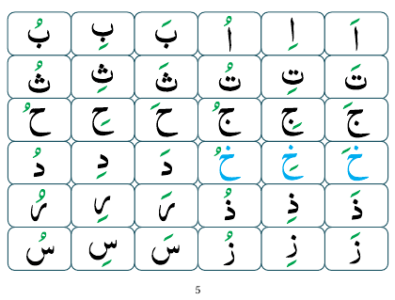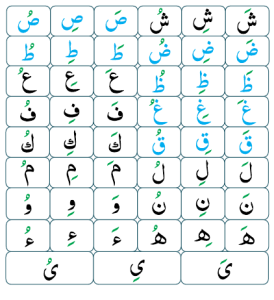Lesson Number 3: Harakaat
If you’ve delved into the intricacies of Arabic grammar, you’ve likely encountered the term “Harakaat.” These diacritical marks play a crucial role in indicating vowel sounds and pronunciation in Arabic script. But what happens when we discuss more than one Harakaat? Let’s explore the fascinating world of Arabic grammar and uncover the plural of Harakaat.
- The plural of Harakah is ‘Harakaat’. Fathah [Zabar], Kasrah [Zayr]andDammah [Paysh] are called Harakaat. Fathah [Zabar] and Dammah [Paysh]are placed above the letter whereas Kasrah [Zayr] is placed underneath.
- The letter which has a Harakah on it is called ‘Mutaharrik[ah]’.
- Pronounce the Fathah [Zabar]by opening the mouth and raising the voice, Kasrah [Zayr]by dropping the voice and Dammah [Paysh]by therounding of the lips.
- Pronounce the Harakaat in an Arabic accent without stretching or suddenly pausingthe voice.
- If a Harakah or Sukoon is present on an ألف” then pronounce it as Hamzah,
Understanding the Significance of Harakaat
In Arabic script, Harakaat, also known as vowel marks or diacritics, are symbols placed above or below letters to represent short vowels or other phonetic features. They are indispensable for correct pronunciation and understanding the nuances of Arabic text, particularly in contexts such as Quranic recitation, poetry, and linguistic analysis.
Demystifying the Plural of Harakaat
In Arabic grammar, forming the plural of nouns involves applying specific rules based on the noun’s pattern and gender. However, when it comes to non-living objects, such as Harakaat, the pluralization process can vary.
The plural of Harakaat is “حَرَكَات” (Harakaat), pronounced as “harakat” with a slight emphasis on the second syllable. Unlike many Arabic nouns that undergo morphological changes to indicate plurality, Harakaat remains unchanged in its plural form. This is because Harakaat are considered abstract entities rather than physical objects, and thus, they do not adhere to the typical pluralization rules.
Utilizing Harakaat in Arabic Texts
Whether you’re a student learning Arabic or a scholar delving into classical Arabic literature, understanding the function and placement of Harakaat is essential for accurate reading and interpretation. By mastering the art of recognizing and applying Harakaat, you can enhance your proficiency in Arabic language skills, including reading comprehension, pronunciation, and grammar.
Incorporating Harakaat into Your Learning Journey
If you’re new to Arabic or seeking to refine your language skills, incorporating Harakaat into your learning materials can be immensely beneficial. Many beginner-level Arabic textbooks and online resources include Harakaat alongside text passages to aid learners in pronunciation and comprehension. Additionally, specialized courses focusing on Arabic phonetics and grammar often dedicate significant attention to teaching the proper usage of Harakaat.
Conclusion: Embracing the Beauty of Arabic Grammar
In the rich tapestry of Arabic grammar, Harakaat serve as guiding stars, illuminating the path to linguistic mastery and comprehension. By unraveling the mysteries of Harakaat and embracing their significance in Arabic script, learners can embark on a transformative journey of language acquisition and cultural immersion.
Whether you’re navigating the pages of classical Arabic literature or engaging with contemporary Arabic texts, the knowledge of Harakaat empowers you to unlock the beauty and depth of the Arabic language. So, embrace the challenge, explore the nuances, and let the journey of discovery unfold as you delve into the plural of Harakaat and beyond.


